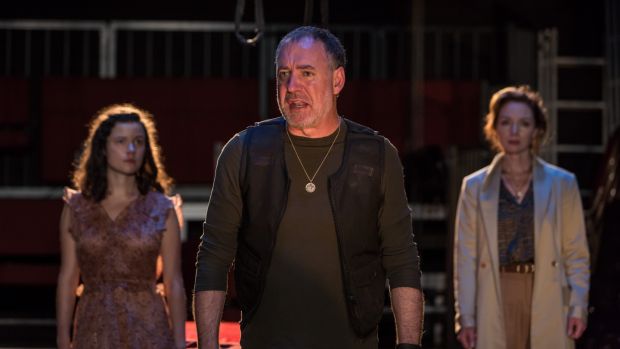
The Dublin Theatre Festival wrapped up its season in Dublin with a stunning programme, celebrating everything from queer identity to reimagining classics like Synge’s The Playboy of the Western World. It was a diverse playbill which didn’t neglect any of its potential audience.
One of the festival’s flagship productions was Hecuba, a collaboration between the playwright Marina Carr and the company Rough Magic Theatre. This was a story of the spoils of war, not the people who fought, but the ones who lost. Aislín McGuckin’s stunning performance carried the play. Playing the title character of Hecuba, she showed the audience grace and decorum, and how that can be destroyed by grief. The production meandered at times, raising questions about its two-hour runtime. However, the sharp, emotive dialogue always brought the production right back to ground. Despite being a reimagining of an ancient play, it was difficult not to see the relevance of the burning city, the precocious teenager, or the grieving mother.
Unfortunately, The Abbey’s Theatre’s contribution to the festival was significantly less impressive. Last Orders at the Dockside, written by Dermot Bolger, promised its audience “a powder keg of friction”. However, it delivered little more than a nostalgia trip, neglecting its best performers and compelling subjects in favour of introducing far too many plotlines and questionably timed bursts of song. The music itself was a saving grace, continuously joyous and light. It was difficult to leave the theatre without a smile on your face following the last gorgeous song, but this, unfortunately, could not forgive the three hours of wandering storyline that preceded it.
From ANU Productions came the next joy of the festival. Faultline, directed by Louise Lowe, is a site-specific piece set in a Georgian house on Parnell Sq. For this, the company restricted each performance to an audience of about 15. After splitting those present into groups of 10, then four, it told the story of the activists working in the Dublin Gay Rights Movement in 1983. Performed in a house minutes away from where the real Dublin Gay Rights Movement lived, this piece was a heartbreaking and authentic rehashing of history. With stories from a lesbian woman who found her home on Parnell Sq, to the ex-Belvedere spearhead of the movement, it was incredibly representative of a history often erased. This was a truly special performance, leaving its audience grateful for the shoulders of giants we don’t always know we stand upon. Its run already extended, tickets to Faultline will be available until December 1st at a concession rate of €15.
Hidden right at the back of town, Belvedere’s O’Reilly Theatre hosted MÁM, a 90-minute piece produced by Teac Damsa. Following its critically acclaimed 2016 Swan Lake – also premiering at the Dublin Theatre Festival – the company brought a similarly beautiful movement piece. This production stretched the limits of theatre, proving that lack of words doesn’t mean a lack of meaning. With a full band and large ensemble, the dance piece filled the massive auditorium with joy at one moment, heartbreak at another. It boasted a distinct sense of Irishness with its use of a pack of Tayto, and its continued return to the ceili. MÁM never gave too little, and never pushed the audience over the edge. It kept them exactly where they needed to be, on the edge of their seats, always gasping – along with the dancers – for more.
Overall, the Dublin Theatre Festival created a program on the pulse of Irish identity. What it ended up delivering was something beautiful, current, and exciting. After one month of excellence in theatre, from the Fringe Festival to Dublin Theatre Festival, Dublin can look back at the past four weeks as something to be proud of.






